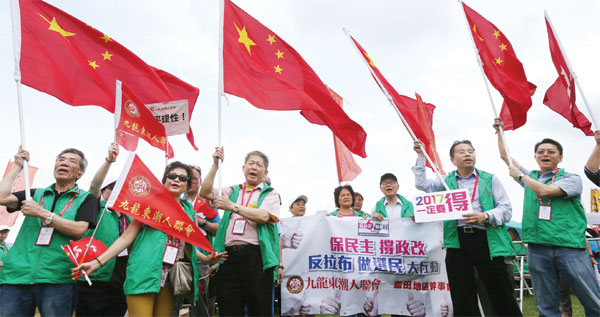HK legislators start debating on electoral reform motion
(Xinhua/chinadaily.com.cn) Updated: 2015-06-17 14:59
 |
| Residents of Kowloon East wave national flags and shout slogans in support for the electoral reform package at a rally in Tamar Park on June 6, 2015. [Parker Zheng / China Daily] |
BEIJING - The Hong Kong legislature began debating the single largest democratic reform in the city's history on Wednesday as a handful of lawmakers hold in their hands the fate of more than three decades of political wrangling over the issue of giving residents the right to vote for their leader.
The motion to amend the Basic Law and grant universal suffrage under a framework endorsed by the Standing Committee of the National People's Congress could come to a vote in the evening at the earliest.
The government is seeking to secure the two-thirds majority vote needed to alter Hong Kong's mini-constitution.
If the proposal is passed, candidates for the role of chief executive will be vetted by a 1,200-strong committee made up of representatives from different economic, political and social sectors who may support multiple candidates and will recommend and nominate two or three candidates.
Candidates who secure support from at least half the nominating committee will then face the city's registered voters.
With 42 votes out of a total of 70 all but spoken for in favor of the package, a margin of five votes is all that is needed to grant the 3.5 million registered voters a say in who runs the city from 2017.
Anything less and the opposition's campaign to veto the proposal despite overwhelming support for it will succeed, retaining the status quo and leaving the group of 1,200 appointees who made up the last election committee in 2012 to choose a chief executive.
Carrie Lam Cheng Yuet-ngor, the chief secretary for administration, has warned that defeat for the proposal will mean the 2012 election method will be retained for the 2017 election.
Defeat will set off a domino effect eliminating "the chance of forming the Legislative Council by universal suffrage in 2020. The result is that we may only have the chance to achieve universal suffrage for the chief executive election in 2022 at the earliest".
Lam said failure to move forward on the reform plan will compel the administration to focus on economic issues in the remaining two years of its term, as Hong Kong's competitiveness faces rising pressure from regional rivals.
Opinion: Seize the opportunity to advance HK democratic development
Wednesday marks a pivotal moment for the future of democracy in Hong Kong.
- Govt encourages people to work 4.5 days a week
- Action to be taken as HIV cases among students rise
- Debate grows over reproductive rights
- Country's first bishop ordained in 3 years
- China builds Tibetan Buddhism academy in Chengdu
- Authorities require reporting of HIV infections at schools
- Typhoon Soudelor kills 14 in East China
- Police crack down on overseas gambling site
- Debate over death penalty for child traffickers goes on
- Beijing to tighten mail security for war anniversary







